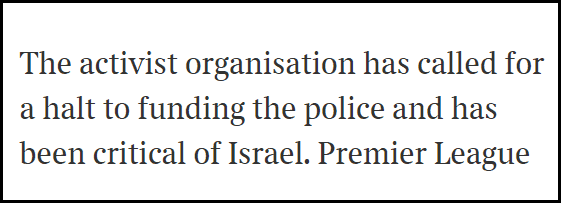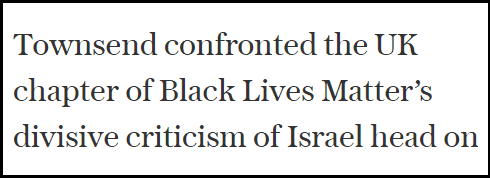When checking for instances of antisemitism and anti-Israel bias in the media, HonestReporting regularly scans the news section and the op-ed department, as well as taking a close look at any relevant cartoons, caricatures, and photographs. But sometimes politics and sports become intertwined.
Recent developments with the organization BLM UK are a case in point.
Join the fight for Israel’s fair coverage in the news
Criticism is “Gagged” — BlackLivesMatter UK’s Antisemitic Tweet
Just last week, we credited the BBC for its decision to ban presenters from wearing badges in support of the BLM organization, following a string of tweets that many adjudged to have crossed the line from supporting black people’s human rights to something altogether less acceptable.
One tweet in particular stood out. Making reference to Israel’s plans to apply sovereignty to certain areas within the West Bank, the organization claimed that “British politics is gagged of the right to critique Zionism.”

The claim that British politics is “gagged” is as laughable as it is risible. Within days BLM UK was disproved by none other than Boris Johnson, the Prime Minister of the UK himself, as he took to the pages of an Israeli national newspaper to criticize Israel’s annexation aspirations.
Both the British press and British politics are full of leading figures who openly express support for the Palestinians and openly talk disapprovingly of settlement construction, sometimes sharply so. In what reality is anyone in Britain “gagged?”
It’s important to see this claim for what it is. Suggestions that Israel, or a pro-Israel lobby, has silenced others from criticizing Israel is a modern iteration of the age-old antisemitic trope that “Jews control the world”.
Extreme versions of this theory posit that a “Zionist Occupation Government” has installed itself as a state within a state, in which a secret Zionist organization controls international banks, and through them multiple governments, in order to put Jewish interests ahead of all else.
Of course, given the level of international opprobrium faced by Israel in the halls of the UN and the EU, as well as by leading politicians and journalists in Britain and elsewhere, the claim that Israel is a deep state anywhere which has stifled all criticism is clearly ridiculous and should be identified for what it is: a contemporary form of classic antisemitism.
Unfortunately, much of the British media has been unwilling to say so plainly.
Over the last few days, numerous articles have appeared in the British press, documenting reactions to the tweet. For example, The Times of London published an article by its chief sports correspondent, Matt Lawton, on Friday, July 3, entitled “We support Black Lives Matter but not pressure groups, say Crystal Palace.” In the article, Lawton describes Black Lives Matter UK as having “called for a halt to funding the police and has been critical of Israel.”

Lawton is not alone in taking this line when writing for The Times. His colleague, Jonathan Northcroft, had an article published the next day, July 4, in which he wrote that, “the activist organisation, Black Lives Matter UK, posted social media messages critical of Israel…”

The mode of extreme non-judgement was not limited to The Times. The UK’s other main broadsheet, the Daily Telegraph, published an article, “Sky Sports pundits swap their Black Lives Matter badges for Kick It Out ones” on July 5 about the ongoing pushback against BLM, in which writer Tom Morgan documents how footballer Andros Townsend became the first Premier League player to distance himself from BLM. According to the article, “Townsend confronted the UK chapter of Black Lives Matter’s divisive criticism of Israel head on…”

The phenomenon repeated itself in the the Daily Mail, not just one of Britain most popular papers, but one of the web’s most read news sites. An article by Daniel Davis published on July 4 said that “Question marks were raised after a series of tweets was released by BLM which had criticised Israel…”

It’s important to state this clearly: Antisemitic dogwhistles are not simply “criticism.” They’re not even “divisive criticism.” They ares hate speech, and ought to be labeled as such.
“Criticism” generally implies a logical argument based on facts. But BLM UK posited no argument against a policy, politician or leader. This isn’t criticism. It’s the floating of an absurd conspiracy theory without a shred of evidence.
Related Reading –
Should the journalists responsible read this article, it’s likely they will feel that this piece is overly-sensitive. After all, so many reporters have done exactly the same thing in referring to BLM UK’s message as “criticism”. Could they really all be wrong? To them, we pre-empt: Beware of the dangers of groupthink. Journalists are particularly susceptible to employing words and phrases that other journalists are using, trotting out trite platitudes and observations. Just because others have made the same mistake, doesn’t make it any truer.
To be fair to journalists, reporting can be a challenging trade. Tight word limits, constant time pressure, and the need to find compelling content are hard enough to contend with, so when sports writers find themselves thrust into the area of politics, it’s somewhat understandable that they may not be as keenly aware of political issues as a dedicated politics reporter.
That said, these are some of the biggest newspapers in the world. Each article must have been seen by multiple pairs of eyes before hitting the press. Whether the journalists are on familiar territory or not, the end result is that in mis-categorizing hate speech as “criticism,” the media are playing a role in the whitewashing of antisemitism.
Join the fight for Israel’s fair coverage in the news


